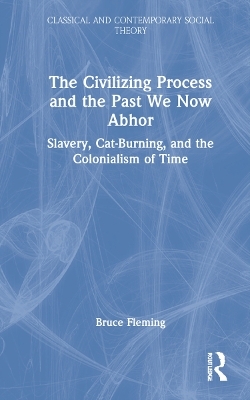
The Civilizing Process and the Past We Now Abhor
Slavery, Cat-Burning, and the Colonialism of Time
Seiten
2022
Routledge (Verlag)
978-1-032-12737-8 (ISBN)
Routledge (Verlag)
978-1-032-12737-8 (ISBN)
Drawing on Elias’ thought on the civilising process, this book explores the ways in which we deal with a past that we now abhor, judging the individuals of history outside the context in which they lived and demanding cosmetic rather than real changes to the world in an attempt to address past wrongs.
Drawing on the thought of Norbert Elias and using as a thread a purposely apolitical example of cruelty to animals to focus on changes in attitudes, this book explores the ways in which we deal with a past that we now abhor. As we struggle to deal with the fact that our past shapes us—indeed is us, but is not us—and cannot be changed, the modern tendency is to demand merely cosmetic rather than real changes to the world and to judge harshly the individuals with whom the past is populated, pulling down statues or re-naming institutions. An examination of our modern colonialism of time rather than place, which refuses to consider or accept the fact that without our past, we wouldn’t be here at all, let alone in a position to judge, The Civilizing Process and the Past We Now Abhor will appeal to scholars and students of sociology, cultural studies, and literature with interests in contemporary questions of race, morality, and efforts to correct the wrongs of our past.
Drawing on the thought of Norbert Elias and using as a thread a purposely apolitical example of cruelty to animals to focus on changes in attitudes, this book explores the ways in which we deal with a past that we now abhor. As we struggle to deal with the fact that our past shapes us—indeed is us, but is not us—and cannot be changed, the modern tendency is to demand merely cosmetic rather than real changes to the world and to judge harshly the individuals with whom the past is populated, pulling down statues or re-naming institutions. An examination of our modern colonialism of time rather than place, which refuses to consider or accept the fact that without our past, we wouldn’t be here at all, let alone in a position to judge, The Civilizing Process and the Past We Now Abhor will appeal to scholars and students of sociology, cultural studies, and literature with interests in contemporary questions of race, morality, and efforts to correct the wrongs of our past.
Bruce Fleming is Professor of English at the US Naval Academy and is the author of The End of the Modernist Era in Arts and Academia, Why Liberals and Conservatives Clash, Sexual Ethics: Liberal vs. Conservative, and The New Tractatus: Summing Up Everything, among other works.
Introduction: The Problem 1. Bad Manners 2. Woody 3. Past Produces Present 4. Slavery 5. Explanations 6. Rituals 7. The Modern Age 8. Democracy 9. Durkheim 10. Groupthink 11. The Polyglot West 12. Changes 13. People and Pets 14. Reparations 15. Forty Years in the Wilderness
| Erscheinungsdatum | 21.04.2022 |
|---|---|
| Reihe/Serie | Classical and Contemporary Social Theory |
| Verlagsort | London |
| Sprache | englisch |
| Maße | 138 x 216 mm |
| Gewicht | 453 g |
| Themenwelt | Geschichte ► Teilgebiete der Geschichte ► Wirtschaftsgeschichte |
| Sozialwissenschaften ► Ethnologie | |
| Sozialwissenschaften ► Soziologie ► Allgemeines / Lexika | |
| ISBN-10 | 1-032-12737-6 / 1032127376 |
| ISBN-13 | 978-1-032-12737-8 / 9781032127378 |
| Zustand | Neuware |
| Haben Sie eine Frage zum Produkt? |
Mehr entdecken
aus dem Bereich
aus dem Bereich


